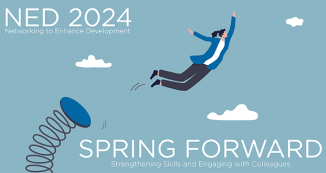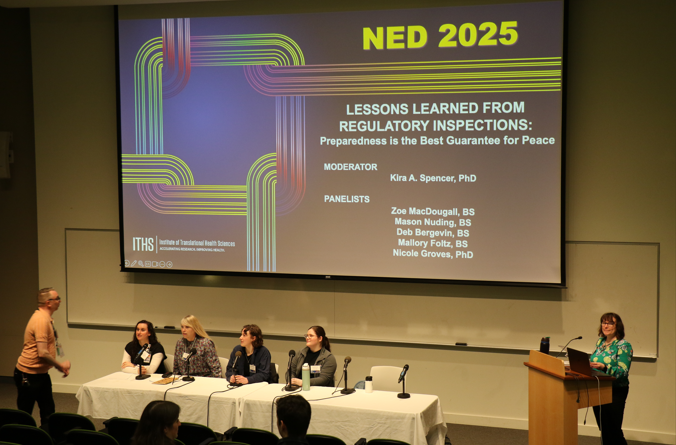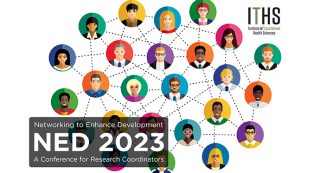
17 Sep Networking to Enhance Development (NED) conference
850 Republican St
Seattle, WA 98109
USA

Networking to Enhance Development (NED) is designed specifically to meet the professional development and networking needs of research coordinators. Participants from UW, FredHutch/SCCA, Seattle Children’s, and other Seattle research institutions, attend both general sessions and choose relevant breakout sessions to expand their knowledge and skills. This year’s theme is Sharing Knowledge from the Frontlines of Research Coordination: When Experience Meets Evidence .
Conference Agenda
Detailed session descriptions and speaker information below.
Session Information
How We Make a Difference: The Real Impact of Research Coordination
How We Make a Difference: The Real Impact of Research Coordination
This inspiring general session kicks off the day and will focus on how research coordinators positively affect investigation outcomes, and have opportunities for professional growth and success. Reflect on your own experience and knowledge and leave this session ready to expand your footprint.
Speaker: Martha Horike-Pyne, University of Washington
Martha Horike-Pyne, MPH, CIP is a Senior Research Coordinator at the University of Washington Division of Medical Genetics, and the Research Manager at the Northwest Institute of Genetic Medicine. Martha focuses on consenting participants into genetic studies and manages over 40 IRB approvals for a large research program. Martha uses her interest in human subjects protections as a scientist board member for two Seattle area IRBs. This work has allowed her to gain valuable insight into the needs of investigators and the requirements of the IRB. She has considerable experience in creating template consent form language for GWAS studies and in the evaluation of existing consent forms for NIH dbGaP compliance.
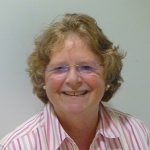
Strengthening Relationships with External Partners (Breakout 1)
Strengthening Relationships with External Partners (Breakout 1)
This interactive session will help coordinators navigate working relationships with monitors, clinic staff, and other sponsor-level stakeholders to improve implementation in clinic-based research. Attendees will learn how to take a proactive role with stakeholders, discuss real-world examples, work through case studies, and develop best practices to apply to day-to-day work. This session is designed for coordinators who are newer to these relationships and processes. However, we welcome coordinators of all experience levels to join and be a part of developing sustainable best practices that can work across research settings and institutions.
Speaker: Carly Gintz, Seattle Cancer Care Alliance
Carly Gintz is a regulatory and study initiation coordinator at the University of Washington with the Sarcoma research team. Her primary roles is to provide regulatory support and general study start up assistance. Carly brings both basic science and clinical research experience to her role. She received her Masters Degree in Nonprofit Leadership from Seattle University in 2013.

Speaker: Roxanne Moore, Seattle Cancer Care Alliance
Roxanne Moore is the Clinical Research Manager for the University of Washington Sarcoma program. In her role at the UW, Roxanne oversees clinical trials management on a programmatic level, from initial concept submission through study closure. Roxanne has significant experience in clinical trial feasibility and implementation, budget development and negotiation, regulatory management, protocol writing and development, and all pre- and post-award financials. Roxanne has worked in Oncology research for over 10 years, with previous experience both in laboratory and clinical settings.

Everyday Ethics: Problem Solving Day to Day Questions That Give Us Pause (Breakout 2)
Everyday Ethics: Problem Solving Day to Day Questions That Give Us Pause (Breakout 2)
As Research Coordinators, we come across subjective issues that give us pause. It may not be immediately clear if something is a true problem or what might be the best way to proceed, but something feels off. This interactive session widens the angle of how to problem-solve “everyday ethics” by exploring the viewpoints of both research coordinator and bioethicist. Use this session to work through real-world scenarios and contribute, “what would you do.” Leave with additional ways of thinking through scenarios that can be applied to your own work
Speaker: Stephanie Kraft, Seattle Children’s
Stephanie Kraft, JD, is an Acting Assistant Professor at the Treuman Katz Center for Pediatric Bioethics at Seattle Children’s Research Institute and the University of Washington School of Medicine Department of Pediatrics. As a member of the ITHS bioethics core, she conducts empirical research on issues related to improving informed consent for research, and she also participates in the ITHS Research Bioethics Consultation service. Her primary research interests are in understanding how people make decisions about research participation and in developing interventions to improve study enrollment, especially among historically underrepresented patient populations.

Speaker: Kathryn Porter, Seattle Children’s
Kathryn M. Porter, JD, MPH is a Research Scientist for the Treuman Katz Center for Pediatric Bioethics at Seattle Children’s Research Institute. She is the ITHS Bioethics Program Manager and a research bioethics consultant. Her own research focuses on research ethics, improvement of informed consent and the ethical and legal issues related to genetics.

Speaker: Mike Donahue, ITHS
Michael Donahue is a Research Coordinator at the University of Washington, Institute of Translational Health Sciences. In the Research Coordination Center, Mike is a seasoned coordinator, and provides a wide-range of general research coordination, regulatory support, and study monitoring to investigators. Mike has travelled globally to provide research training for investigators and staff, and has become skilled in problem solving recruitment and retention issues. He has provided extensive support for clinical research programs at the UW, HMC, and the VA, including: cardiology, hepatology, nephrology, surgery, oncology, otolaryngology, health services, rheumatology, and rehabilitation medicine.

Clinical Research: Straight Talk about When Expectations Meet Reality (Breakout 3)
Clinical Research: Straight Talk about When Expectations Meet Reality (Breakout 3)
What is the experience of research coordination really like? In this session, Reina will leverage her experience as manager of the SCCA Phase I group to describe the realities of clinical research coordination. She will share lessons learned about clinical research operations, important relationships, mistakes, and navigating available resources. Learn how to apply these lessons to your own work and increase your effectiveness and professionalism.
Speaker: Reina Hibbert, Seattle Cancer Care Alliance
Reina Hibbert, CCRC, has been working in the clinical research industry for almost 15 years. Her previous experience includes bench laboratory and Institutional Review Board operations. With an extensive clinical and regulatory research background, Reina currently works on protocol development, streamlining implementation and risk-based study management in early-Phase oncology drug trials.

Genetics: Coming to a Study near You (Breakout 4)
Genetics: Coming to a Study near You (Breakout 4)
Genetic research is ubiquitous in investigations to diagnose, treat, prevent and cure human diseases. As more is learned about how genes affect human experiences beyond disease, genomic research is quickly becoming a powerful tool in other disciplines. Research areas such as education, psychology, and bioengineering are using genomic information to explain why some participants are responders while others are non-responders to diverse stimuli. This session will describe the specific skills Research Coordinators need to enroll, consent, explain and protect participants in genetic studies
Speaker: Martha Horike-Pyne, University of Washington
Martha Horike-Pyne, MPH, CIP is a Senior Research Coordinator at the University of Washington Division of Medical Genetics, and the Research Manager at the Northwest Institute of Genetic Medicine. Martha focuses on consenting participants into genetic studies and manages over 40 IRB approvals for a large research program. Martha uses her interest in human subjects protections as a scientist board member for two Seattle area IRBs. This work has allowed her to gain valuable insight into the needs of investigators and the requirements of the IRB. She has considerable experience in creating template consent form language for GWAS studies and in the evaluation of existing consent forms for NIH dbGaP compliance.

Emerging Topic of Interest: Pragmatic Clinical Trials (Breakout 5)
Emerging Topic of Interest: Pragmatic Clinical Trials (Breakout 5)
Curious about pragmatic clinical trials? In this session we will consider two aspects of managing a pragmatic clinical trial (PCT): developing a communication plan and thinking through regulatory issues. This session will begin with an introduction to PCTs that explores what they are and how they differ from randomized clinical trials. Then, it will be time to get practical. Using a sample PCT, we will create a communication plan that speaks to the robust and ongoing partnerships central to a PCT. Because PCTs sit at the crossroads of research and care delivery (in real clinics, hospitals, etc.), they are also at the intersection of different laws, regulations, ethical guidelines, and policies. We’ll use our sample PCT to uncover key differences and similarities.
Speaker: Tanya Matthews, Kaiser Permanente Washington
Tanya Matthews is the IRB Director for Kaiser Permanente Washington. She has worked in research for 20+ years and in regulatory compliance for 13. In her current role, she oversees IRB review for the Kaiser Permanente Washington and the KP Washington Health Research Institute (KPWHRI). KPWHRI, formerly Group Health Research Institute, is a national leader in health services and clinically-embedded research. KPWHRI and the KPWA IRB have extensive experience navigating the complex design, conduct, and regulatory compliance for pragmatic clinical trials.

Research Regulatory Reform Review or “May You Live in Interesting Times” (Breakout 6)
Research Regulatory Reform Review or “May You Live in Interesting Times” (Breakout 6)
During the past year, federal regulators have made sweeping changes to longstanding regulations and have implemented new policies designed to reform clinical research. These landmark reforms will impact the research landscape in ways that will unfold for several years. From NIH’s Single IRB policy to the upcoming Revised Common Rule, this session covers the major regulatory changes you need to know about, how to identify what types of research will be impacted, as well as where to go for resources as you navigate these interesting times.
Speaker: Adrienne Meyer, University of Washington
Adrienne Meyer, MPA, CIP, is the Assistant Director for Researcher Support in the Human Subjects Division at the University of Washington. Adrienne is a regulatory specialist and frequent lecturer on issues associated with regulatory compliance and research ethics in a broad spectrum of research disciplines. Adrienne has been at the UW for nearly 20 years and has worked in many capacities with researchers from nearly every department and research discipline: from behavioral research with young children to first-in-human chemotherapy trials. She was recently a member of the Research on Medical Practices (ROMP) Ethics study team, which applied qualitative and quantitative methods to understand patient preferences for research consent.

PANEL: The Coordinator as Patient: Insights from Dual Roles
PANEL: The Coordinator as Patient: Insights from Dual Roles
Coordinators are highly skilled at recruiting participants for research studies, including talking to patients and families about the risks and benefits of study participation. What happens, though, when a coordinator or their child becomes a study participant themselves? Does the knowledge of what happens “behind the scenes” impact their willingness to participate or their confidence in the study conduct? Panel members will discuss their experiences on the other side of the research fence, with key insights about how being a study participant has changed how they communicate with their study teams and patients.
Moderator: Tasha Murphy, Seattle Children’s
Tasha Murphy, PhD is the Research Manager for the Research Coordinator Core at Seattle Children’s Hospital. She leads a team of highly skilled research coordinators who support translational research throughout Seattle Children’s. Tasha has a PhD in Clinical Psychology with a specialization in pediatrics and behavioral medicine. She has more than 55 published manuscripts in the areas of pediatric quality of life, behavioral interventions in pediatric chronic illness management, health disparities, and global health.

Panelist: Courtney Dethlefs, Seattle Children’s
Courtney Dethlefs is a Clinical Research Associate in the Research Coordinator Core at Seattle Children’s Hospital. Courtney has worked in both the Center for Childhood Behavioral and Development coordinating Autism Spectrum Disorder clinical trials, and currently in the Center for Clinical and Translational Research. The core provides CRA support to investigators throughout the hospital, and her work includes managing a variety of research projects and clinical trials, from regulatory maintenance, audit prep, inpatient and outpatient consenting and recruitment, visit coordination involving multiple hospital service areas.

Panelist: Laura Ferrara, Oregon Health Science University
Laura Ferrara is part of the Oregon Rural Practice Research Network based at Oregon Health Science University. As a Practice Enhancement Research Coordinator, she works with health care clinics throughout rural Oregon to identify novel ways to increase adolescent vaccination rates, concentrating on the HPV vaccine. Previously, she coordinated a variety of clinical research trials and qualitative studies as part of the Research Coordinator Core- UW ITHS at the University of Washington Medical Center. She also has experience working for Institutional Review Boards as an administrator at the University of Washington Human Subjects Division IRB and Group Health Cooperative (Kaiser) IRB. She has a masters degree in demographic and social analysis from University of California at Irvine.
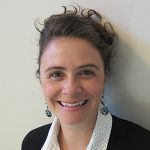
Panelist: Erica Peters, Seattle Cancer Care Alliance
Erica Peters, CCRC is a Certified Research Coordinator and Clinical Research Project Manager at the University of Washington/Seattle Cancer Care Alliance, with the Phase 1 Clinical Trials Program. At SCCA, Erica is a senior coordinator with over 7 years of experience in first-in-human oncology trials. In her prior role, Erica worked at SCCA as a pharmacy technician for over 5 years, with experience in IV admixture as well as the Investigational Drug Services field.

We’re sorry – we have reached the maximum number of attendees for this event. Registration is now closed.




